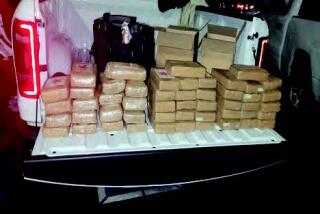Drug Trade Bank Accounts Rise in Panama Despite Laundering Law
- Share via
PANAMA CITY, Panama — Several months after Panama, under U.S. pressure, passed a law making the laundering of drug profits a crime, executives in the nation’s lucrative banking centers reported that business is still booming.
A predicted rash of withdrawals never occurred, and the law has yet to be tested by U.S. authorities seeking to investigate accounts believed to belong to known drug-traffickers.
“To assert that in Panama money will leave because the law against narcotic traffickers was approved is equal to accepting that all the funds deposited in this country come from drug trafficking, which is a lie and is absurd,” said Mario de Diego, head of the government National Bank Commission.
“We believe that there is absolutely no reason for the law to affect bank operations,” de Diego said.
A different explanation was given by Edgardo Molino Mora, dean of the University of Panama law school.
“The (drug) business is so lucrative that sometimes they considered it to be worth the trouble to risk it,” he said.
The measures against laundering drug money are only a portion of comprehensive anti-narcotics legislation signed into law Dec. 30, which also bans bail for suspected drug traffickers and imposes stiff sentences on those involved in the drug trade.
But the measures applying to the 129 banks operating in Panama mark the first time the laundering of drug profits has become a crime--punishable by jail sentences of between two and eight years.
The law stipulates that there must be proof bank employees or others knowingly accepted money from the drug trade.
Experts said the money usually is filtered through shell corporations whose real owners are difficult to trace, thereby giving no direct link to traffickers.
“The banking system must understand that there is a net of individuals who are constantly managing shell companies that exist exclusively to make bank deposits and withdraw money,” Molino Mora said. “There is something strange there.”
Molino Mora said he rejected a recent request to incorporate betwen 15 and 20 shell companies a month for a fee of $7,000 each. The going rate averages $400 per corporation.
“To me, that immediately smelled of drug trafficking. It smelled rotten,” Molino Mora said.
Critics of the law argued that bankers may be torn between the desire for more profits and apprehension over turning in clients they suspect are involved in the drug trade.
“People have a terrible fear to go and present their suspicions because they know that afterwards they’re not going to have any type of protection, and the same day or the following day when there is a formal accusation, they could wind up being found shot dead on the street,” Molino Mora said.
Under the new law, U.S. officials who wish to investigate the accounts of alleged drug traffickers must prove in a Panamanian court that they have reason to believe the accounts are linked to narcotics.
Attorney General Carlos Agusto Villalaz said U.S. officials “are studying it, but still there is no kind of case.”
For the past three years, Panama had been pressured by the United States to pass a Mutual Legal Assistance treaty that would have permitted American officials access to suspicious bank accounts.
“It’s obvious they passed this law to satisfy the United States,” said a South American banker, who asked not to be identified.
Initially, bankers feared the law might weaken bank secrecy, which with the use of the U.S. dollar as legal tender, has built the Panamanian banking center into an industry with $38 billion in assets.
The government allayed misgivings by meeting repeatedly with the banking community while drafting the legislation.
“In general the bankers think it’s a good law. We have been amply consulted and we fully share its contents,” said Swiss banker Werner Luthi.
On the subject of suspicious bank accounts, the new law stops short of the controversial Mutual Legal Assistance Treaty, which also would have included cooperation with the United States in areas such as income-tax evasion.
“What interests us here are other businesses that are legal in Panama but are not legal in other places--like flight capital,” the South American bank executive said.
So far the new law appears to have had little effect on the banking center.
“The deposits are constantly going up,” Luthi said. “There is not a break in which you could say now the law is out, now you see a drop in deposits, all the opposite.”
“Everything is absolutely normal,” said Gustavo Perez, assistant manager of the Banco de Colombia.
More to Read
Sign up for Essential California
The most important California stories and recommendations in your inbox every morning.
You may occasionally receive promotional content from the Los Angeles Times.













